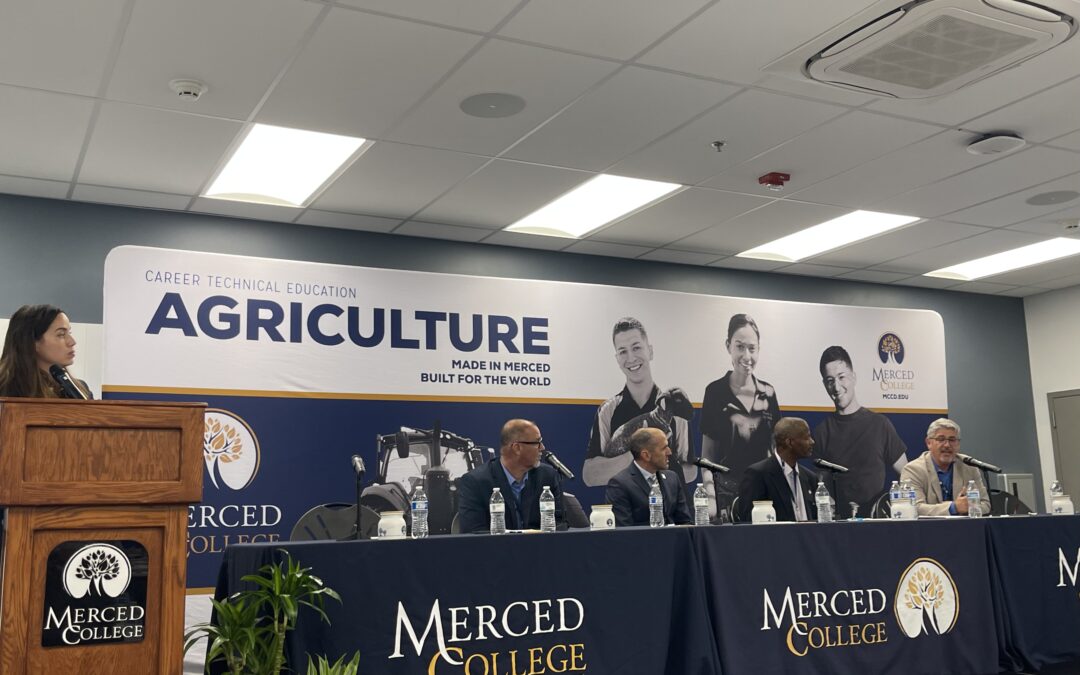By: Alli Sweigard, VISTA F3 Communications Coordinator
03/07/24
There is no doubt that agriculture is one of the most important industries in the world and the Central Valley is working hard to keep people interested in ag careers.
On Thursday, March 7th, Merced College hosted an event centered on agricultural technology education. “Ag Tech x Ed – Developing the Next Generation of Ag Tech Employees,” was jointly organized by the Western Growers Association, the California Department of Food and Agriculture, and Merced College.
One of the key highlights of the event was a panel discussion titled “Education and Workforce Development Strategies.” Dr. Josh Viers, Associate Vice Chancellor of Interdisciplinary Research at UC Merced, lent his expertise to the panel, alongside other college and university educators from the region.
The panel, moderated by Karen Aceves, CEO of Arken Strategies, discussed landscape of ag tech workforce development and how we are preparing and encouraging current students to find future careers in agriculture. Dr. Viers emphasized the importance of incorporating new technology into industry practices.
“There’s a lot of flavors of artificial intelligence out there, but we’re using it in some pretty remarkable ways,” he said. “We’re reducing fuel consumption that leads to a more climate resilient future, we’re designing agrivoltaics so that we can couple vegetable crop production with energy production on the same piece of ground.”
Dr. Viers noted that projects like these are what make a research university work, but that it’s impossible to do those things without the human talent to come up with the ideas and inventions.
Another panelist, Dr. Rolston St. Hilaire, Dean of Agriculture at Fresno State’s Jordan College of Agricultural Sciences and Technology announced that Fresno State plans to integrate autonomous driving vehicles onto their thousand-acre farm in the coming months. Taking on these new technologies gives students the chance to familiarize themselves with it before joining the workforce.
The event also featured panel sessions focusing on industry issues and skills identification. Industry partners had the opportunity to discuss specific skills gaps, trends, and upcoming needs, contributing to a comprehensive understanding of the workforce landscape.
A lot of the panel discussions pointed out the struggle to find motivated individuals who want to work hard.
“When we talk about work ethic, the ones that stay late, the ones that get it done, the ones that want to pursue the American Dream, that’s right here,” said Dr. Viers, “we see it in Merced – people locating here because of the opportunity afforded by F3, to build innovation and pursue entrepreneurship.”
Aaron Hamilton, Professor of Industrial Electronics at Merced College, added to the topic discussion by noting that he hold his students accountable just as an employer would by making sure they’re present, on time and get their work done, “I really run my class as if I’m their supervisor to get them ready to go to work, to work for somebody,” he said.
The discussion session finished up with a fireside chat with Karen Ross, Secretary for the California Department of Food and Agriculture, offering the audience further insights into the state’s agricultural priorities.
Dr. Viers highlighted UC Merced’s commitment to driving innovation and collaboration in agricultural technology education. As the sector continues to evolve, events like these play a crucial role in shaping the future of ag tech workforce development. Together, these panelists provided valuable perspectives on the challenges and opportunities in ag tech education at both community colleges and universities.

